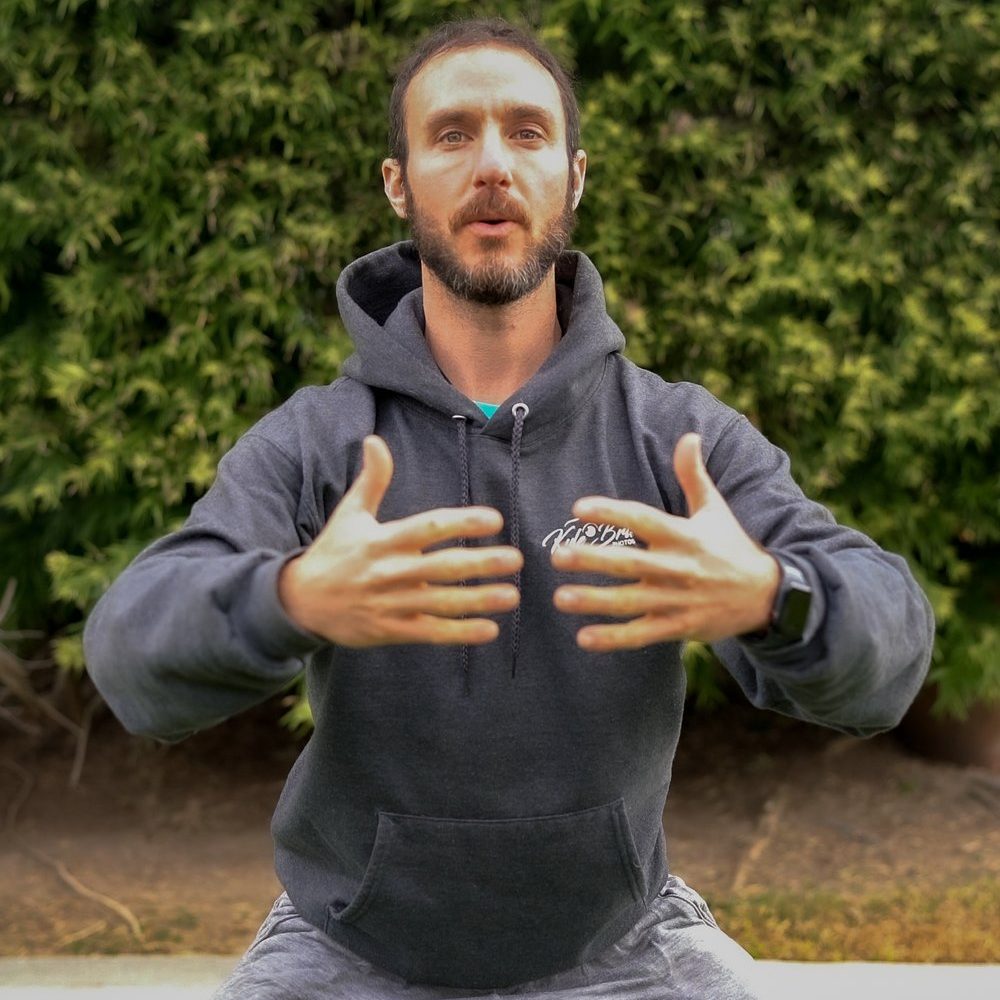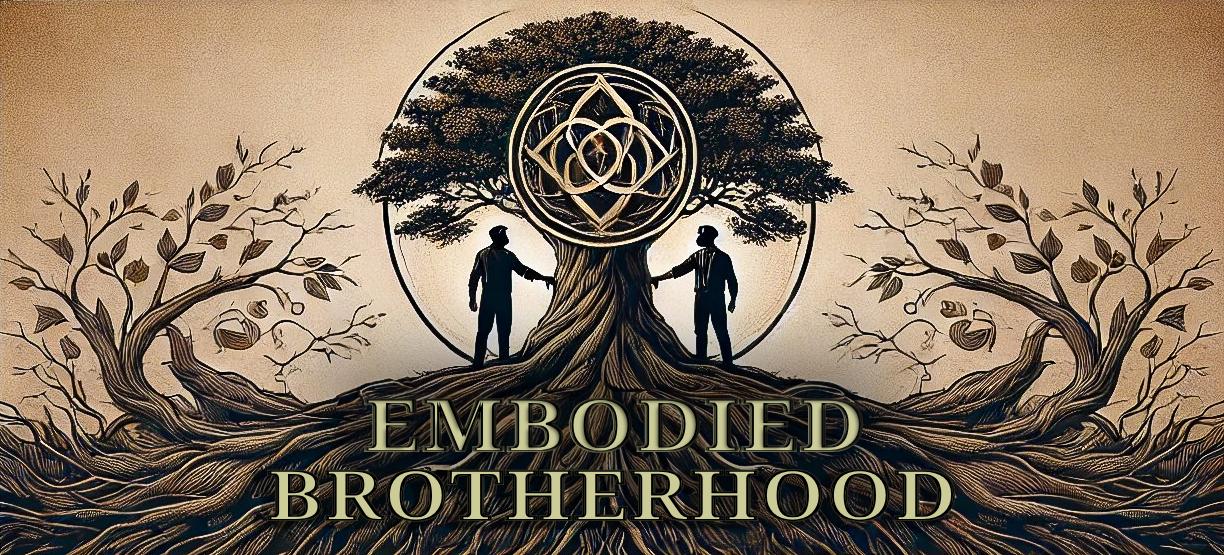About Embodied
Brotherhood: Our Story

“It’s my mission in life to help other men move through life with greater ease, to regulate their nervous system, and connect with their intuition and higher self.”
Kyle Leighton
I first discovered men’s embodiment work through Embodied Masculine in 2019, and I immediately fell in love with the practice and what it had to offer. Many men’s groups focus primarily on talking, which can be valuable, but pairing conversation with movement, breathwork, and presence takes the experience to a deeper level. By getting out of our busy minds and into our bodies, we create space for clarity, connection, and presence.
For me, this work has been a powerful tool for grounding, clarity, and purpose. In times of major life stress or uncertainty—when I’ve felt overwhelmed or disconnected from my emotional center—embodiment practices have helped bring me back to myself.
The Approach
My approach to coaching, growth, and healing is threefold, combining elements of:
• Embodiment — Deepening awareness in the body through breath and movement. Tapping into Gnossis - wisdom in the body.
• Mindset — Re-imagining our beliefs about the world and flexing our power of choice.
• Connection — Deepening your connection to your self and to others. Opening up, seeing ourselves in others, and supporting one another.
My Background
I am a Certified Men’s Embodiment Facilitator (C-EMF), accredited by the International Practitioners of Holistic Medicine (IPHM), with hundreds of hours of experience as a transformational life coach working with both men and women. I have participated in and facilitated countless workshops, gatherings, and retreats—both virtual and in person—throughout California, Washington, Utah, and Massachusetts.
It is my goal to share the gifts I’ve received with others. All are welcome.
I honor my teachers:
- Amir Khalighi - Men’s Embodiment Coach and founder of Embodied Masculine
- Ray Blanchard - Master Trainer and Peak Performance Coach
- Daniel Paraszkay - Transformational Trainer and founder of Life Design Education
- Raquel Hernandez - Life Mastery Coach
Other Influences:
- Dr. Joe Dispenza, Carl Jung, David Deida, John Wineland, Michael Singer, Arthur Brooks, Michael Bungay Stanier
Kyle Bruce Leighton
Founder and Facilitator
About the Founder: My Story

Early Beginnings: Learning Brotherhood
My earliest memories as a child are with my brother, Shawn, who’s two years younger than me. I remember making him laugh when he was upset so that he wouldn’t go and tell our mom. I was probably around four years old, already learning and applying the skill of helping regulate someone else’s nervous system—making him laugh when he was crying, cheering him up, and shifting his energy in the moment.
Later, when I was 12 years old, my mom had a third boy, Dylan. I remember the day he was born. I had to leave baseball practice early for a game to go to the hospital. When I first saw him, I thought he looked so gross and alien. When my mom asked if I wanted to hold him, I said I didn’t want to touch it. But that changed quickly once we got him home, and I loved helping to take care of him. A special bond formed fast.
Fast-forward to when I was 24, fresh out of college and moving back in with my parents. My parents separated that year, and my dad moved across the country. I suddenly had the responsibility of being there as emotional support for my mom and the opportunity to mentor Dylan, who was 12 at the time. I helped him with homework, supported him through school, and gave him the kind of guidance I felt like I had missed out on during my own childhood.
Those years mentoring Dylan were some of the happiest and most fulfilled years of my life. I felt a deep sense of purpose and direction. On top of mentoring my little brother, I had an incredible group of guy friends I spent every weekend with. That period was rich with deep connections, laughter, and meaning. But after my friends had all entered their careers and Dylan went off to college, I lost that sense of connection and purpose.
A Struggle with Meaning: Hitting My Lowest Point
I hit my lowest point around the time I turned 30, circa 2016-2017. I had achieved what I had spent much of my 20s chasing—earning a salaried career, graduating from college, completing grad school, having a girlfriend, and getting into amazing physical shape. I had pursued self-development with intensity and experienced plenty of euphoric highs along the way. But when I reached that point, I was left wondering: What was it all for?
I found myself with a deep sense of emptiness and a lack of meaning in my life. My relationship fell apart, and I was stuck in the monotony of an office job with no passion or direction. I’d come home and fall into toxic coping mechanisms—overworking during the day, taking Ambien at night, and developing a strained relationship with food. I’d spend my evenings alone, burying myself in binge eating, slowly losing my sense of self just to numb the pain and avoid facing the void.
I didn’t know what I was working toward, and I had lost any sense of zest or joy in life.
The Turning Point: Discovering Transformation
In 2018, a friend invited me to a weekend workshop called Freedom, It was the first of 3 parts of the Connections Course - designed to help you connect with your purpose, transform your relationships, and develop your leadership skills
That weekend was the start of something new. I went on to complete their second course, Life Design, and their third course, a three-month program called the Velocity Leadership Program. From there, I volunteered to staff their events and began facilitating and coaching others in breaking through their struggles and redesign their lives and their relationships—with themselves and with others.
For the first time since mentoring Dylan, I felt a deep sense of meaning and purpose: to serve others, to hold space for them as they worked through their own transformations.
I saw pieces of myself in every person I coached—their joys, their struggles, their breakthroughs reflected my own experiences. And in helping them, I was healing parts of myself.
The Power of Brotherhood and Deeper Connection: Why I Do This Work
A year later I discovered men’s embodiment work through Embodied Masculine, and I immediately fell in love with the practice and what it had to offer. First was the outward community. For the first time in my life, I was in a space where I could hear the intimate stories of men from diverse backgrounds. Many of them were older and more experienced than myself, and their perspectives opened my eyes to what it meant to be a man. It was the first time I felt true mentorship from other men.
Second was the inward journey. Many men’s groups focus primarily on talking, which can be valuable, but pairing conversation with movement, breathwork, and presence takes the experience to a deeper level. By getting out of our busy minds and into our bodies, we can create space for clarity, connection, and presence.
For me, this work has been a powerful tool for grounding, clarity, and purpose. In times of major life stress or uncertainty—when I’ve felt overwhelmed or disconnected from my emotional center—embodiment practices have helped bring me back to myself.
When I rely solely on logic to navigate life, I’ve found it often leads me into anxiety, panic, regret, and rumination. But embodiment work—through breathwork, meditation, visualization, mindfulness, and deep connection with others—has been the pathway that opens the door to my spiritual center. Through these practices, I feel connected to something greater—whether you call it God, the universe, or simply a higher vibration with our best interests at heart.
When we quiet the mind through these practices, we can tune into those higher frequencies. From there, we can align our thoughts, feelings, intentions, and actions in ways that truly serve us, bringing us peace, fulfillment, meaning, joy, and wonder.
It’s those moments of true connection, inward and outward, to divine self and other—that have added depth and richness to my life.
There’s something powerful about gathering with other men, being vulnerable, and realizing you’re not alone. It’s healing. It’s inspiring. It’s nourishing.
Many men today are feeling disconnected, lonely, stressed, anxious, and without a sense of purpose. Depression and suicide rates are at all time highs, especially after separation or divorce, where men don’t often maintain the same close social networks that women do.
There’s a great need for this work, and it’s why I do this. This is my purpose. This is my calling.
